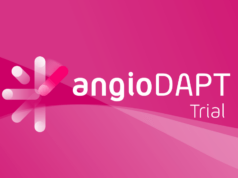
A new study, by researchers from the Intermountain Medical Center Heart Institute (Salt Lake City, USA), indicates that there are no significant differences in the 30-day rate of major bleeding and one-year risk of death, myocardial infarction and urgent repeat percutaneous coronary intervention between patients undergoing PCI who receive heparin and short-term tirofiban (Aggrastat, Medicure) and those who receive bivalirudin (Angiomax, The Medicines Company).
The aim of the study was to determine which of the two regimens were more effective. Researchers studied results from patients who underwent PCI between January 2013 and December 2015. Of the 857 patients enrolled in the study, 402 received heparin plus short-term tirofiban treatment and 455 received bivalirudin. The patients were between the ages of 51 and 78. There was a slight reduction in major bleeding and death with the use of heparin plus short-term tirofiban over bivalirudin alone but – due to the overall low incidence of adverse events – the difference did not reach statistical significance. The 30-day incidence of TIMI major bleeding score was 1.2% for patients treated with heparin and tirofiban and 3.1% for bivalirudin patients.
Additionally, through this observational study of patients undergoing successful elective PCI, the Intermountain researchers found that the risk after 30 days of major bleeding, and one-year risk of death, myocardial infarction and urgent repeat PCI, was low and not significantly different between the two treatment methods.
Lead author the study, J Brent Muhlestein (an interventional cardiologist at Intermountain Medical Center Heart Institute), says: “Bivalirudin has been considered the gold standard for reducing bleeding during PCI, but our study shows heparin plus short-term tirofiban is just as good and possibly better. The results certainly justify a randomised clinical trial to explore identified trends.”
The study was presented at the American Heart Association (AHA) scientific sessions (12–16 November, New Orleans, USA).












